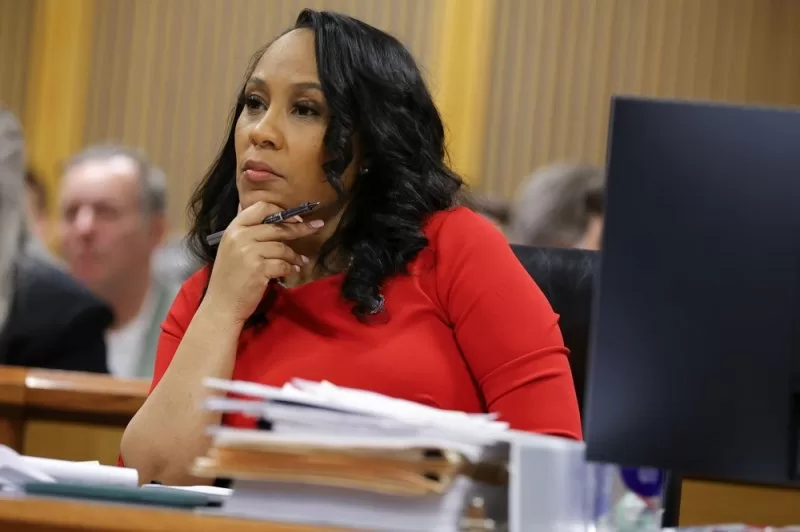1 of 3 | Fulton County District Attorney Fani Willis attends a hearing on the Georgia election interference case at the Fulton County Courthouse in Atlanta on March 1. Pool Photo by Alex Slitz/EPA-EFE
March 15 (UPI) — Superior Court Judge Scott McAfee ruled Friday that Fulton County, Ga., District Attorney Fani Willis can remain on the election subversion racketeering case against Donald Trump and co-defendants.
Mcafee presented the prosecution two options to remove the appearance of a conflict of interest. The first option is that special prosecutor Nathan Wade must be removed from the prosecuting team in order for Willis and the district attorney’s office to continue with the prosecution. The second option: Willis and her office can step aside and “refer the prosecution to the Prosecuting Attorneys’ Council for reassignment.”
The motion to remove Willis was brought to the court in January by Trump co-defendant Michael Roman and his attorney Ashleigh Merchant. The defense uncovered a romantic relationship between Willis and Wade and alleged a conflict of interest, claiming the couple benefited financially from the prosecution.
Trump, who won enough delegates to clinch the Republican nomination for president on Tuesday, has pleaded not guilty.
“While respecting the court’s decision, we believe that the court did not afford appropriate significance to the prosecutorial misconduct of Willis and Wade, including the financial benefits, testifying untruthfully about when their personal relationship began, as well as Willis’ extrajudicial MLK ‘church speech,’ where she played the race card and falsely accused the defendants and their counsel of racism.
“We will use all legal options available as we continue to fight to end this case, which should never have been brought in the first place,” Steven Sadow, Trump’s attorney, said in a statement emailed by the Trump campaign.
McAfee acknowledged the “church speech” in his ruling. During the speech on Martin Luther King Jr. Day, Willis defended Wade’s appointment, saying the defense has targeted him because he is a “Black man.”
McAfee said the speech did not cross the line into tainting the jury pool against the defense but it was “still legally improper.” He floated the idea of issuing a gag order against Willis to prevent her from further discussing the case in public.
The judge also writes that the defense fell short of proving that Willis benefited financially from her relationship with Wade. However he made a point to say the lack of a record to prove that the pair split expenses evenly could leave a reasonable observer to recognize the appearance of a benefit.
“It is the [judge’s] opinion that Georgia law does not permit the finding of an actual conflict for simply making bad choices — even repeatedly,” McAfee wrote.
McAfee also rejected the notion that the prosecution has attempted to prolong the case in order to benefit financially.
“Defendants argue that the financial arrangement created an incentive to prolong the case, but in fact, there is no indication the district attorney is interested in delaying anything,” the court filing reads. “Indeed, the record is quite to the contrary.”
He pointed out that when the indictment was announced, it was the district attorney’s intention to bring the case to trial within six months.
The prosecution sought to try Trump and all 19 co-defendants together, aside from those who successfully had their cases severed. The DA’s office at one point intended to charge fewer defendants but charged more at the special grand jury’s recommendation.
Trump and 19 co-defendants were charged in a conspiracy to overturn the results of the 2020 presidential election in Georgia. The charges allege that Trump and others undertook a “fake electors” scheme, pressured Secretary of State Brad Raffensperger to “find” votes and tampered with election systems.
Five co-defendants have reached plea agreements to avoid trial.
Willis and Wade testified during a series of hearings on the matter. Merchant and attorneys for other defendants, including Sadow, claimed that Willis and Wade lied about when their relationship started. They also called into question several trips the pair had taken together, alleging that improperly undisclosed gifts had been exchanged.
Willis and Wade said in separate testimonies that their relationship began in the spring of 2022 around March. The defense claimed that it began months earlier, around or before November 2021.
Wade’s former law partner and divorce attorney Terrence Bradley testified as the star witness for the defense. However, Bradley did not confirm that Willis and Wade’s relationship started before they said it did.
Bradley told Merchant in a text message that he believed the relationship had begun earlier. On the stand he said he was merely speculating and did not have any firsthand information.
Willis testified that Wade was not her first choice for the special prosecutor role. She met with former Georgia Gov. Roy Barnes and asked him to lead the case. He turned her down, citing the likely threats and harassment he would experience.
The relationship between Willis and Wade ended in the summer of 2023.

